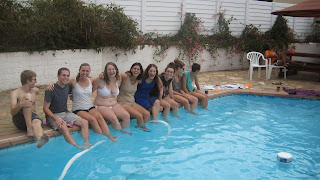By Caleb Rollins and Sarah Nunes
We are all members of communities. This fact is no different in Namibia. In the week of November 18th, it seems that many of us reached the pinnacle of feeling at home in our communities in Namibia. However, this week also initiated the string of inevitable farewells and departures from our Namibian communities that will occur regularly throughout the next few weeks. We will no longer have the ability to enjoy time in these Namibian communities, but we can continue to establish and grow similar communities based on a care for humanity in our own towns, universities, and families.
The theme of community came to light near the beginning of the week during our presentations of our internship research projects. In her promotion of community-based justice, Lena helped us to understand an apt definition of community that reveals its ambiguity and concreteness. A community can range in size from a small group of childhood friends to a Church congregation and even to a large town. In these communities, people often have a common belief system, culture, history, goals, or other uniting factors. Still, no matter the size and unifying element of communities, they all come together because they have something to share. In Namibia, we have all found things to share with people that we have met; therefore, we have had the blessing and opportunity to become members of numerous communities here.
 |
The CGE students made sign welcoming home
their fellow community member Sarah from the hospital.
|
The first and most obvious community in Namibia of which we all have become members, is the CGE house [1]. Forming a community of people from different backgrounds, cultures, and regions is never easy. While community meetings have helped us to discuss some of the details of living in a house together, these and other constructions of intentional community have not served as the primary catalyst of our community formation. We have become a community through sharing our passions over a glass of beer, discussing after dinner the social injustices that we see in our American communities, and reminiscing over the many wonderful people that we have met throughout our lives. It seems as though our shared care and concern for the equality and dignity of all people has played a central role in bringing us together as a community. This concern for the welfare of others becomes glaringly apparent through our reaction to the hospitalization of one of our community members. Despite our various final projects and papers that we had due this week, every member of our community visited Sarah in the hospital because she is a member of our community. More importantly she is a person, and we all care for people. The strength of our community originates in this shared ideal and fortunately many of us have had the opportunity to embody this ideal in the communities of our internships.
Amidst all of the final presentations and papers this week, we also hosted a closing party for our internships. At this party we shared with each other and colleagues from our internships how much we appreciated the opportunity to work with them and how much we would miss them. Implicit in our words was the notion that we had gratefully become a member of their communities and we felt saddened by leaving these communities dedicated to improving the lives of numerous Namibians. We have felt so much at home in these communities because we share something more than our humanity. We share a care for humanity.
 |
The students of the CGE house enjoyed their
last community meeting together.
|
Throughout the semester we have learned of the power that this shared care can have in creating communities and how its absence produces communities that primarily isolate themselves from others. In our religion class, we have learned of the efforts of the Christian Church in Namibia in combatting the apartheid system. Through their shared belief that all humans, no matter their race deserve freedom, equality and dignity, the Church formed a community of Christians and others in Namibia which helped lead to the independence of this nation. In development we learned of the benefits of community based natural resource management, where village communities protect their natural resources in order to sustain their ecosystems and alleviate poverty. However, when outside organizations partner with these communities, the programs generally only have success when equal power exists in the partnership. If outside organizations fail to consider the human dignity and autonomy of their partners, then the community fails in its effectiveness. Lastly, in history we have learned how the oppressive system of apartheid established white communities based on the apathy of the welfare of black human beings. While this belief may have brought together white people into a community, this community lacked wholeness because it ultimately created isolation, rather than communion.
Thus, while the departure from our Namibian communities saddens us, we have learned the value of creating and entering communities based on the idea of caring for other humans. We cannot simply leave this idea in the CGE house or at our internship communities; we must continue promoting this type of basis for community in our families, on our campuses, and in our towns or cities. Only through this type of community can we begin to realize the vision of a beloved global community, where all people are cared for and always have friends to visit them in the hospital.
____
[1] During their semester through the Center for Global Education in Southern Africa, students live and study together in Windhoek with travel to different regions of Namibia and South Africa throughout.

No comments:
Post a Comment